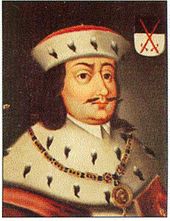Frederick II, Elector of Saxony
| Frederick II | |
|---|---|

Frederick the Gentle
|
|
| Elector of Saxony | |
| Reign | 4 January 1428 – 7 September 1464 |
| Predecessor | Frederick I |
| Successor | Ernest |
| Landgrave of Thuringia | |
| Reign | 7 May 1440 - 1445 |
| Predecessor | Frederick IV |
| Successor | William II |
| Margrave of Meissen and Duke of Saxony | |
| Reign | 4 January 1428 – 7 September 1464 |
| Predecessor | Frederick IV/I |
| Successor | Albert IV/III |
| Born |
22 August 1412 Dresden, Electorate of Saxony, Holy Roman Empire |
| Died | 7 September 1464 (aged 52) Leipzig, Electorate of Saxony, Holy Roman Empire |
| Spouse | Margaret of Austria |
| Issue among others... |
Amalia, Duchess of Bavaria Anna, Electress of Brandenburg Ernest, Elector of Saxony Albert, Duke of Saxony |
| House | House of Wettin |
| Father | Frederick I, Elector of Saxony |
| Mother | Catherine of Brunswick and Lunenburg |
| Religion | Roman Catholicism |
Frederick II, The Gentle (Friedrich, der Sanftmütige; Frederick the Gentle) (22 August 1412 in Leipzig – 7 September 1464 in Leipzig) was Elector of Saxony (1428–1464) and was Landgrave of Thuringia (1440–1445).
Frederick was the eldest of the seven children of Frederick I, Elector of Saxony, and Catherine of Brunswick and Lunenburg.
After the death of his father in 1428 he took over the government together with his younger brothers William III, Henry and Sigismund. In 1433 the Wettins finally concluded peace with the Hussites and in 1438 Frederick led Saxon forces to victory in the Battle of Sellnitz. That same year it was considered the first federal state parliament of Saxony. The parliament received the right to find together in case of innovations in fiscal matters also without summoning by the ruler.
After Henry's death in 1435, and Sigismund was forced to renounce and became a bishop in (1440), Frederick and William divided their possessions. In the Division of Altenburg in 1445, William III received the Thuringian and Frankish part, and Frederick got the Eastern part of the principality. The mines remained common possessions. Disputes over the distribution led however in 1446 to the Saxon Brother War, which found an end only on 27 January 1451 with the peace of Naumburg. In the Treaty of Eger in (1459), elector Frederick, Duke William III and the king of Bohemia George of Podebrady fixed the borders between Bohemia and Saxony, at the height of the Ore Mountains (German: Erzgebirge) and the middle of the Elbe which still holds today. It belongs therefore to the oldest still existing borders of Europe.
...
Wikipedia
